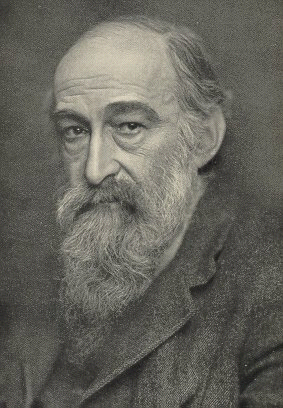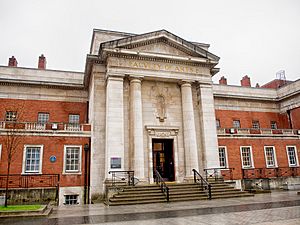Samuel Alexander facts for kids
Quick facts for kids
Samuel Alexander
|
|
|---|---|
 |
|
| Born | 6 January 1859 Sydney, New South Wales, Australia
|
| Died | September 13, 1938 (aged 79) Manchester, England
|
| Alma mater |
|
| Era | 20th-century philosophy |
| Region | Western philosophy |
| School |
|
|
Main interests
|
Metaphysics |
|
Notable ideas
|
Emergent evolution |
|
Influenced
|
|
Samuel Alexander OM FBA (born January 6, 1859 – died September 13, 1938) was an important philosopher. He was born in Australia but became a British citizen. He was also the first Jewish person to become a fellow at an Oxbridge college (Oxford or Cambridge).
Contents
Early Life and Education
Samuel Alexander was born in Sydney, Australia. His father, who was a successful saddler, died before Samuel was born. His mother, Eliza, moved the family to Victoria when Samuel was young. They settled in St Kilda.
In 1871, Samuel started at Wesley College, Melbourne. He was a very good student and always appreciated the excellent education he received there. In 1875, he began studying arts at the University of Melbourne. He was a top student, earning high marks and awards in subjects like Greek, Latin, English, mathematics, and science.
Moving to England
In 1877, Samuel traveled to England to try for a scholarship. He decided to go to Oxford and applied to Balliol College. Even though his tutor thought it would be tough, Samuel won a scholarship.
At Oxford, he continued to excel. He achieved top grades in both classical and mathematical studies. He also earned a first-class degree in his final exams for his Bachelor of Arts in 1881. Two of his teachers, philosopher T. H. Green and Latin expert Henry Nettleship, greatly influenced his early ideas.
His Work and Ideas
After finishing his degree, Samuel Alexander became a fellow at Lincoln College. He taught philosophy there from 1882 to 1893. During this time, he became very interested in psychology, which was not a widely studied subject back then.
In 1887, he won a prize for an essay on moral philosophy. This essay later became his book, Moral Order and Progress, published in 1889. He also wrote articles for philosophical journals. In 1890-91, he even worked in a psychology lab in Germany.
In 1893, Alexander became a professor at the Owens College, Manchester (now the University of Manchester). He stayed there for the rest of his career. He quickly became a respected leader at the university. He was known for his unique teaching style, which drew students and colleagues to him.
Life in Manchester
In 1902, his whole family moved from Australia to live with him in Manchester. His sister became a wonderful hostess, and their home was a popular gathering place for fellow staff, former students, and friends.
Samuel Alexander was also a mentor to the writer Naomi Mitchison. He took a serious interest in her studies and writing, often sending her long letters with helpful advice. Mitchison later wrote about him fondly in her autobiography. She mentioned his love for cycling, which was his favorite way to get around Manchester.
Achievements and Recognition
Alexander received many honorary degrees from universities like St Andrews, Durham, Liverpool, Oxford, and Cambridge. From 1908 to 1911, and again from 1936 to 1937, he was the president of the Aristotelian Society, a group for philosophers. In 1913, he became a fellow of the British Academy.
His most famous work, Space, Time, and Deity, was published in 1920. This two-volume book was a huge and bold attempt to explain how everything in reality works, starting with space and time. It made a big impact on philosophers at the time.
In 1924, Alexander retired from his teaching position. However, he remained active, giving lectures and serving on committees. He also kept up his interest in Jewish communities in England and Palestine.
Honors and Later Works

In 1925, a sculpture of his head, made by Jacob Epstein, was given to the University of Manchester. It was placed in the arts building, which is now named after him. In 1930, he received the Order of Merit, a very special honor in Britain. He was the first Australian-born person to receive it.
In 1933, he published Beauty and Other Forms of Value, a book about aesthetics (the study of beauty and art). He hoped artists would share how they created their work, but not many did.
Final Years and Legacy
In his later years, Samuel Alexander was very concerned about the struggles faced by Jewish people in Europe. He spent a lot of time and money trying to help them.
He passed away on September 13, 1938. He was never married. His ashes are buried in Manchester Southern cemetery. He left most of his money to the University of Manchester and some to the University of Jerusalem.
After his death, a collection of his writings called Philosophical and Literary Pieces was published in 1939. Samuel Alexander was known as a great teacher who had a wide influence, even though he was sometimes informal in class. He is remembered as one of the most important thinkers of his time.
Today, a theater at Monash University in Melbourne, Australia, is named after him. Also, the Humanities Lime Grove building at the University of Manchester was renamed the Samuel Alexander Building in 2007. A copy of his bust by Epstein is in its lobby.
Philosophical Ideas
Samuel Alexander's main goal as a philosopher was to explain everything in the world using the simplest ideas possible. He believed that space and time were the most basic things, and that you couldn't imagine one without the other. He even thought of space and time as a kind of "stuff" that everything is made of.
He also said that space and time could be thought of as "Motions." This means that for Alexander, movement is the most basic thing, and space and time are defined by how things move in relation to each other.
In his book Space, Time, and Deity, Alexander explained that when you see an object, like a chair, the chair itself is not inside your mind. Your mind is simply aware of the chair. He also said that thinking about an object is different from thinking about the act of thinking itself. He believed that the act of thinking could only be experienced, not observed like an object.
Alexander was a contemporary of A. N. Whitehead, another famous philosopher whom he influenced. He also guided other thinkers who became important in 20th-century British philosophy. Some people describe his views as panentheistic, which means he believed that God is in everything, but also more than everything.
Books
- Moral Order and Progress (1889)
- Locke (1908)
- Space, Time, and Deity (1920)
- Spinoza and Time (1921)
- Art and the Material (1925)
- Beauty and Other Forms of Value (1933)
- Philosophical and Literary Pieces (1939) (published after his death)
Images for kids
See also
In Spanish: Samuel Alexander para niños
 | John T. Biggers |
 | Thomas Blackshear |
 | Mark Bradford |
 | Beverly Buchanan |



